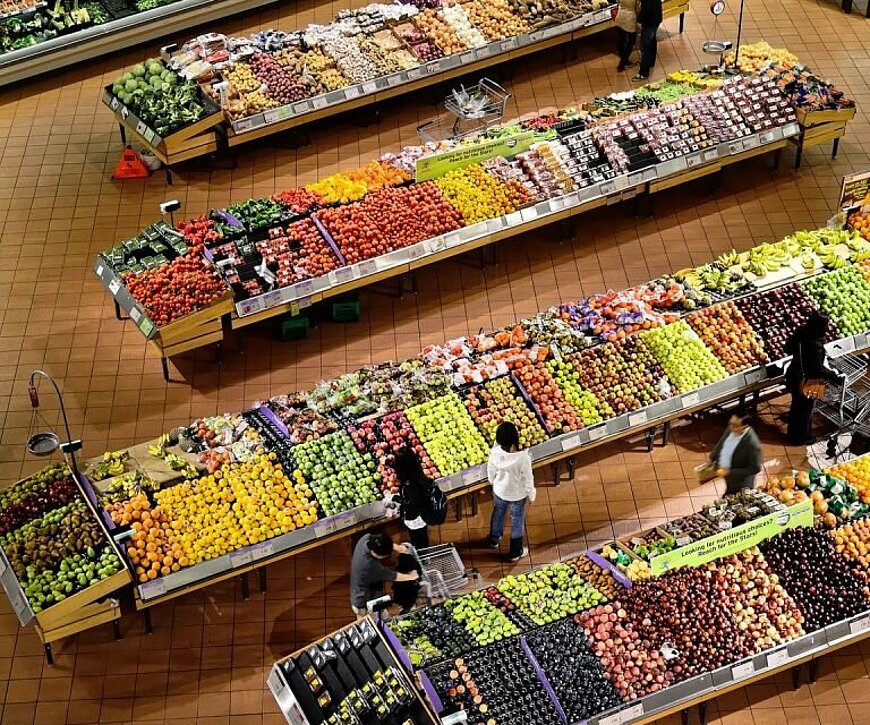FoodRoot label helps you choose truly sustainable products

Sustainable food. More and more people are working on it. Healthy food, a fair price for farmers and a good life for animals are often high on the list of priorities. Hundreds of labels such as Fairtrade and Better Life should help consumers make sustainable choices. But are all these labels equally reliable? And do you know exactly which label stands for what? With the FoodRoots information label you can see at a glance how sustainable a product is.
Thomas Fransen, student of sustainable innovation at Eindhoven University of Technology (TU/e), is developing a platform where consumers can immediately see the total environmental impact of a product. This combination of different sustainability aspects distinguishes FoodRoots from other labels, according to Fransen. "The current labels often represent only one specific part of food production, which causes confusion. In addition, they are often not transparent at all, so consumers do not really know why a product gets a certain quality mark", says the French.
Overarching quality mark
He mentions Fairtrade as an example. "If I order Fairtrade mint tea, I know the farmers got a fair price for the mint. But that coin could have been shipped from Sri Lanka to the Netherlands, for example, while coin is also growing in the Netherlands. So is it necessary to emit so much CO2?" FoodRoots, the platform of the French, combines as many figures as possible to create a kind of overarching label. This includes, for example, CO2 emissions, animal rights, water consumption and plastic pollution.
Now listen to The IO Show!
The French prefer not to call FoodRoots a hallmark because they don't want to dictate to consumers what to choose. "It is important that people become aware of the impact of a certain product," says the French. "For example, people see that the production of cheese has a greater impact on the environment than the production of chicken. That can cause people to make different choices in their diet."
QR code
The French hope that one day the FoodRots score will be on all packaging in the supermarket. "That number alone doesn't say much," the French admit. "But by scanning a QR code, consumers can see how the score has been built up and how sustainable a product is." The student doesn't have the illusion that consumers in the shop are really going to scan every product. "As consumers, we don't look at the nutritional value of every product either. But the fact that you can easily see how the score has been built up creates confidence. It is completely transparent." In addition, consumers can easily compare products by means of the score.
Even though compiling such a score is not so easy. "Sustainability has several aspects. There is the economic side, the ecological side and the social side. And on the social side there are various aspects, such as human rights but also animal rights. It's difficult to determine what we do and don't include in the score and how heavy the various elements weigh", explains the French.
Independent platform
In order to ensure that the platform has a broad support base and is as objective as possible, the 'open source' will be developed. "We think it is important that everyone who can contribute to it is given the opportunity to do so," says the French. The team does not work for profit. "We would love it if this score were really institutionalized, just like the Nutri-Score." This score will soon be introduced to indicate to consumers which products are healthy.
"To do that, we don't need to shield the platform to work on it as a small company. The more people think along, the faster the development goes". He indicates that students are very suitable for this. "We're not affiliated with any company, so we can work independently. In addition, we have the knowledge and the urge to improve the world. But we don't have a mortgage or children yet. In that sense, earning money is less important."
This independence is precisely the reason why the French think that FoodRoots is going to make a difference in the country of labels. "If we had to make a profit, it would have been difficult to set up platforms like this anyway. In addition, consumers probably trust it less because they also know that a company wants to make money. As a result, they are more likely to expect a snag".
FoodRoots is part of TU/e innovation Space. More stories about this kind of special initiatives can be found here.
Changing food production
In the long term, the French hope to use FoodRoots to bring about a change in food production. "Farmers say that they can only produce sustainably if they invest money in it. But then the price has to go up. Consumers just don't want to pay for sustainable products anymore," he says. "That's quite apart from the fact that they often don't know what exactly is sustainable." It is a vicious circle from which we as a society find it difficult to emerge. "By offering transparency through FoodRoots, I hope that consumers will make more sustainable choices. In addition, farmers must provide more insight into their production and they are kept to their word".
Article by Innovation Origins